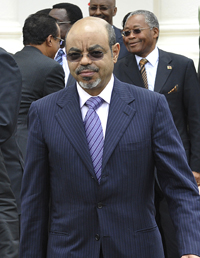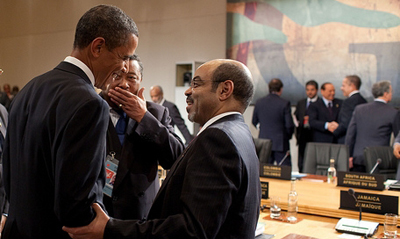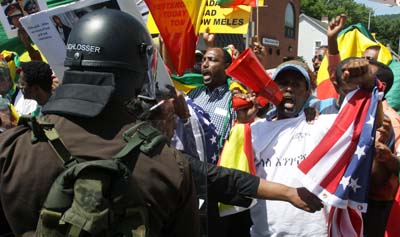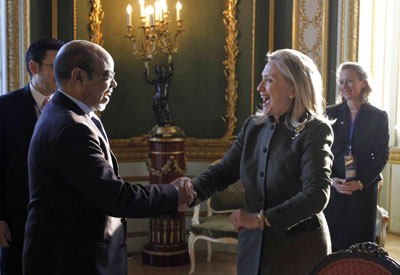
Where is Meles Zenawi? Ethiopians don’t know.
If you search for the name of Ethiopia’s prime minister, Meles Zenawi, on Twitter these days, you’ll see a flurry of incongruent postings: Meles is hospitalized in critical condition; he’s fine and returning to work; he died two weeks ago; he’s on holiday. Journalists for international news outlets have tried to sort out fact from…

Ethiopia sentences Eskinder, 5 others on terror charges
Nairobi, July 13, 2012–An Ethiopian court today handed down heavy prison sentences to six journalists convicted on vague terrorism charges, local journalists and news reports said. Award-winning blogger Eskinder Nega got an 18-year term; the others live in exile and were sentenced in absentia.
High-tech censorship on the rise in East Africa
Ethiopia has always been a country at the cutting edge of Internet censorship in Africa. In the wake of violence after the 2005 elections, when other states were only beginning to recognize the potential for online reporters to bypass traditional pressures, Meles Zenawi’s regime was already blocking major news sites and blog hosts such as…

US senator condemns Ethiopia’s persecution of the press
On Wednesday, the same day the White House announced a strategic plan committing the United States to elevating its efforts in “challenging leaders whose actions threaten the credibility of democratic processes” in sub-Saharan Africa, a senior member of the U.S. Congress challenged the erosion of press freedom in a key U.S. strategic partner in the…
CPJ and Africa Media Initiative meet Ethiopian minister
Addis Ababa, June 11, 2012–The Committee to Protect Journalists and the Africa Media Initiative (AMI) called for the release of journalists being held under Ethiopia’s anti-terrorism laws and requested a review of those laws as they affect freedom of speech.

Members of Congress urge Meles to end repression
Two members of the U.S. Congress, a Republican and a Democrat, have publicly voiced indignation at Ethiopia’s persecution of journalists under the leadership of Prime Minister Meles Zenawi, with both declaring that stability and security are enhanced by press freedom.
Obama should raise press freedom in Africa food talks
New York, May 16, 2012–President Obama should acknowledge the role that independent news reporting plays in assessing agricultural challenges and facilitating the response to famine, the Committee to Protect Journalists stated in a letter to the White House. Ethiopia in particular downplays the extent of food crises and undermines the ability of donor nations and aid groups to help by denying journalists access to sensitive areas and censoring independent coverage.

In Ethiopia, new printing directive equals pre-censorship
New York, May 9, 2012–Ethiopia’s main, state-owned printing company has directed newspaper publishers to censor any content that may draw government prosecution under the country’s anti-terrorism law or face cancellation of their printing contracts, according to local journalists and news reports.

Blogger fights terror charges as Ethiopian leader praised
Last week in the Ethiopian capital, Addis Ababa, while Prime Minister Meles Zenawi was making a speech about Africa’s growth potential at an African Union forum, a journalist who his administration has locked away since September on bogus terrorism charges was presenting his defense before a judge. Eskinder Nega has been one of the most…
